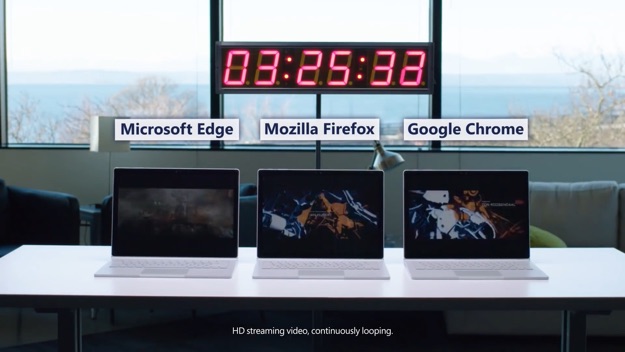Microsoft Rails Against Google Chrome Promoting Edge Efficiency In Windows 10 Creators Update

According to the latest numbers from NetMarketShare, Google Chrome has 59 percent of the browser market, while Microsoft is looking rather dire in its positioning, with a dismal 3.78 percent share. Despite the fact that few people are paying attention to its rantings, Microsoft is at it again with a new video highlighting the efficiency advantages of Edge compared to Chrome:
In the video, Microsoft claims that the version of Edge that is shipping with the Windows 10 Fall Creators Update bests both Chrome and Mozilla Firefox in battery life benchmarks. Interestingly, it appears that Google has closed the gap in recent months, as Edge is "only" outperforming Chrome by 19 percent in battery life testing this time around. However, Edge's advantage over Firefox opened up to a wide 63 percent.
Microsoft performed the tests using three identically spec'd Surface Book convertibles, each running Edge, Chrome or Firefox. All of the Surface Books were timed running the same exact streaming video. The Surface Book using Firefox as the browser gave up after 9 hours and 52 minutes, while the device running Chrome called it a day after 13 hours and 32 minutes. Given that this was a Microsoft-sponsored test, the Surface Book running Edge ran the clock out to 16 hours and 8 minutes.
The Windows 10 Fall Creators Update was publicly released on October 17th, and Microsoft is currently testing the next major release of Windows 10, codenamed Redstone 4. As for Mozilla, it recently launched the first public build of Firefox 57 (Quantum), which delivers huge gains in usability and performance. Google recently shored up Chrome's defenses with optional Site Isolation, at the expense of increased memory usage (10 to 20 percent).

